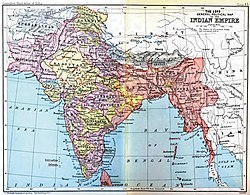Islam in India
| Total population | |
|---|---|
| approx. 180 million (2015 estimate) | |
| Regions with significant populations | |
|
Throughout India Majority in Jammu and Kashmir and Lakshadweep. Large concentration in Assam and West Bengal. Large populations in Uttar Pradesh, Bihar, Maharashtra and Kerala. |
|
| Languages | |
| Main languages spoken are Urdu, Bengali, Dakhini, Awadhi, Arabic and some other regional languages of India | |
| Religion | |
| Sunni, Ahle Sunnat Barelvi, Ahmadiyya, Shia, Dawoodi Bohra, Wahabi and Deobandi. |

Imperial entities of India
|
|
| Dutch India | 1605–1825 |
|---|---|
| Danish India | 1620–1869 |
| French India | 1769–1954 |
|
|
|
| Casa da Índia | 1434–1833 |
| Portuguese East India Company | 1628–1633 |
|
|
|
| East India Company | 1612–1757 |
| Company rule in India | 1757–1858 |
| British Raj | 1858–1947 |
| British rule in Burma | 1824–1948 |
| Princely states | 1721–1949 |
| Partition of India |
1947
|
|
|
|
Islam is the second largest religion in India, with 14.2% of the country's population or roughly 172 million people identifying as adherents of Islam (2011 census). Islam first came to the western coast of India when Arab traders as early as the 7th century AD came to coastal Malabar and Konkan-Gujarat.Cheraman Juma Masjid in Kerala is thought to be the first mosque in India, built in 629 AD by Malik lbn Dinar. Following an expedition by the governor of Bahrain to Bharuch in the 7th century AD, immigrant Arab and Persian trading communities from South Arabia and the Persian Gulf began settling in coastal Gujarat.Dawoodi Bohra Ismailli Shia was established in Gujarat in the second half of the 11th century, when Fatimid Imam Mustansir sent missionaries to Gujarat in 467 AH/1073 AD. Islam arrived in North India in the 12th century via the Turkic invasions and has since become a part of India's religious and cultural heritage. Over the centuries, there has been significant integration of Hindu and Muslim cultures across India and Muslims have played a prominent role in India's economic rise and cultural influence.
...
Wikipedia
